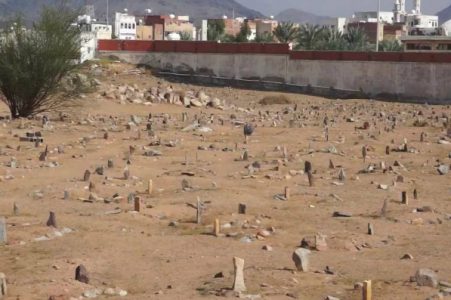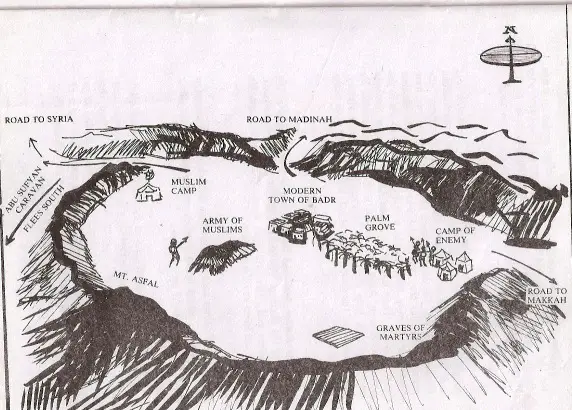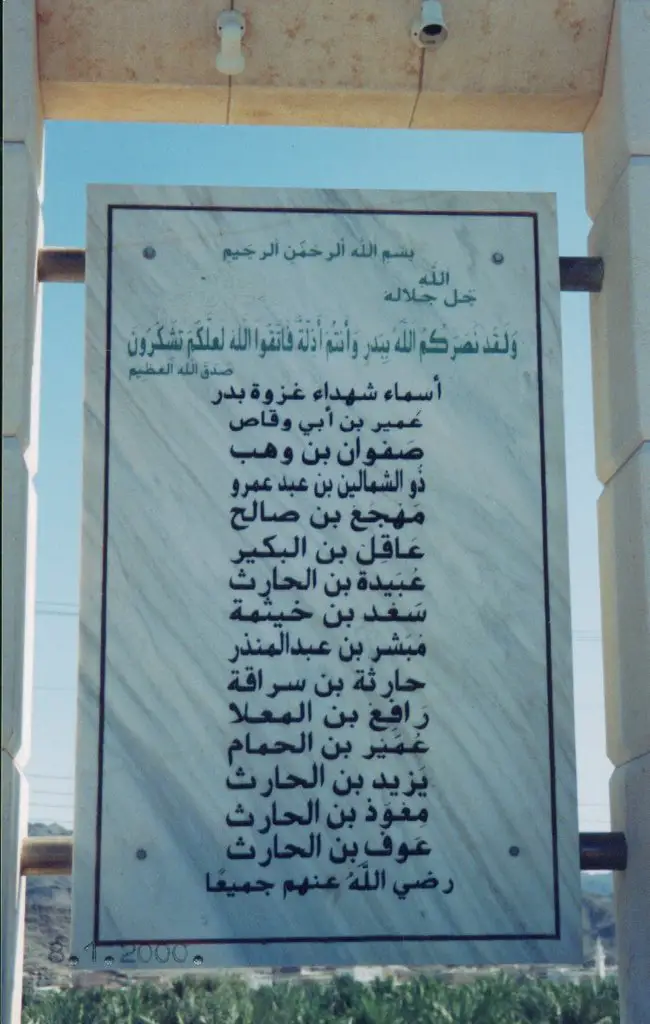313 Badri Sahaba names: Visiting Battle of Badr: Remembering 14 Badri sahaba martyred in Badr: My Visit to Battle of Badr
Battle of badr -17 Ramadan 2AH
The Battle of Badr, fought on the 17th of Ramadan in 2 AH, holds immense significance in Islamic history as the first major battle that marked a victory for the Muslims against the Quraysh.
The Battle of Badr, or Ghazwah Badr, was the first major conflict in Islam, occurring in the second year of Hijrah. This historic event took place near the town of Badr and highlighted the courage, resilience, and faith of the Muslims under the leadership of Rasul Allah Sallalahu alaihe wa sallam. Visiting the site where this battle occurred, I found myself reflecting deeply on the struggle and sacrifice of the Badri Sahaba (Companions of Badr).I began to recall the Quranic Ayah and the Hadeeths on the “Battle of Badr. ” I was emotionally carried into the history of time.
This is an independent website by a Female scholar.If you benefit from our articles, Help our Projects by buying our Worksheets (Link1) or (Link2) or removing ads. Bookmark our website so that you can visit it daily for(Digital Tasbih) or (Salah Tracker).
When I arrived at Battle of Badr, it was afternoon. The Sun was at his Peak. I looked at the Sun and felt the Struggle of the sahabas.
When Was the Battle of Badr Fought?
Do you know when was the battle of badr fought? The Battle was fought on 17th of Ramadan, 2AH.Yes it was fought in the Second year of Hijri in the middle of Ramadan.

I looked all around and I tried to visualise the Battle. I had a Map of battle of Badr in my mind and I tried to put the Map in real Picture. I was standing near the graves of Martyrs and it was not possible to exactly visualize the Map into reality but yes, I drew a Rough guess. My heart was filled with awe. I Sent Darud and Salutation on my Prophet SAW and I glorified Allah for the Victory he always gives to the believers. This Battle Field was a Living example when Allah granted victory to the Muslims who were 313 in number against their Well equipped enemy who were thrice their strength. This is the Map –
Who Fought in the Battle of Badr?
Among the 313 Muslims who bravely fought in Badr were notable companions like Sayyiduna Abu Bakr, Sayyiduna Ali, and Sayyiduna Hamza (radi allahu anhum). Those who fought in the battle of Badr are known as the Badri Sahaba. They displayed unwavering courage despite facing a Quraysh force three times their size.
So I went to the Place where the names of the Suhadas of Badr is inscribed and for the First time I went through all the Names. It was difficult to stand in the Scorching Sun and read all the names but I when my eyes caught the names of Some Sahabas that I have studied, I recalled their great Sacrifice and my eyes filled with tears .
14 Badri sahaba
Badri sahaba- The Sahara who fought at Battle of Badr.
How Many Muslims Fought and Died in the Battle of Badr?
The 313 Muslims who took part in the battle faced overwhelming odds. Despite the challenges, Allah granted them victory, solidifying their faith. The battle also witnessed the martyrdom of 14 Muslims who fell on the battlefield. These shuhada (martyrs) are honored as those who sacrificed their lives for Islam’s early struggles.
Rafi’ bin Khadij said: “Jibril or an angel came to the Prophet and said: ‘How do you regard those among you who were present at Badr?’ He said: ‘They are the best among us.’ He said: ‘We think the same (of the angels who were present at Badr), they are the best of the angels.'”
Names of 14 sahaba martyred in Badr:Badri Sahaba names
the battle. Their names are listed at the site of the battle.They were :
1) Sayyiduna ‘Umayr ibn Abi Waqas. رضي الله عنه
2) Sayyiduna Safwan ibn Wahb. رضي الله عنه
3) Sayyiduna Dhu-Shimalayn ibn ‘Abdi. رضي الله عنه
4) Sayyiduna Mihja’ ibn Salih. رضي الله عنه
5) Sayyiduna ‘Aqil bin al-Bukayr. رضي الله عنه
6) Sayyiduna ‘Ubaydah ibn al-Harith. رضي الله عنه
7) Sayyiduna Sa’ad ibn Khaythama. رضي الله عنه
8) Sayyiduna Mubashir ibn ‘Abd al-Mundhir. رضي الله عنه
9) Sayyiduna Harithah ibn Suraqah. رضي الله عنه
10) Sayyiduna Rafi’ ibn Mu’ala. رضي الله عنه
11) Sayyiduna ‘Umayr ibn Humam. رضي الله عنه
12) Sayyiduna Yazid ibn al-Harith. رضي الله عنه
13) Sayyiduna Mu’awidh ibn al-Harith. رضي الله عنه
14) Sayyiduna ‘Awf ibn al-Harith. رضي الله عنه
These Sahabas will always be remembered till the end of the time for their great Sacrifice . They were favored by Allah because they showed their tawakkul in Allah and Love for dear Prophet SAW that we can’t even imagine. Some stories of Sahabas I want to share are –
Sayyiduna ‘Umayr ibn Abi Waqas. رضي الله عنه was one of the youngest Martyr in the Battle of Badr . When the Prophet (Sallallahu Alyhi wasallam) encouraged the Muslims to prepare for the battle of Badr, ‘Umayr (RadhiAllahuAnhu) was very eager to join them, despite his young age. He accompanied the army and tried to conceal himself. When he was asked why he was hiding, he replied:
“I fear that the Prophet (SallallahuAlyhiwasallam) may see me and deem me to young to fight, whereas I am very eager to fight in the path of Allah and attain martyrdom.”AllahuAkar ! was only sixteen years old. When the Prophet (SallallahuAlyhiwasallam) inspected his army, he spotted ‘Umayr and told him that he was too young to battle.‘Umayr began to cry so much until the Prophet (SallallahuAlyhiwasallam) felt sympathised and permitted him to join the army. He fought in the battle and his wish of Martyrdom was granted
Ubaydah ibn al-Harith رضي الله عنه
When Utbah ibn Rabi’ah cut off his leg ,he recited a Poetry which is still remembered. It was
You may cut off my leg, yet I am a Muslim.
I hope in exchange for a life near to Allah,
with Houris fashioned like the most beautiful statues,
with the highest heaven for those who mount there.‘Ubaydah (RadhiAllahuAnhu) was taken by his companions to the Prophet (SallallahuAlyhiwasallam), with blood flowing endlessly from his leg. He asked: “Am I not a martyr of Prophet of Allah?” The Prophet (SallallahuAlyhiwasallam) replied: “Certainly!
Rafi’ Ibn al-Mu’alla al-Ansari رضي الله عنه He was killed by ‘Ikramah Ibn Abi Jahl, who later accepted Islam and was also martyred.“Allah Ta’ala smiles at two men, one of them kills the other but they both enter Jannah. One of them fights in the path of Allah and is killed. Then Allah forgives the killer [who enters Islam] and he later fights in the path of Allah and is also killed.”(Narrated by Imam Bukhari on the authority of Abu Huraira (RadhiAllahuAnhu)
Haritha Ibn Suraqah al-Ansari رضي الله عنه
Anas told that ar-Rubaiyi‘ daughter of al-Bara’, who was the mother of Haritha b. Suraqa, came to the Prophet and said, “Prophet of God, will you not tell me about Haritha? (He had been killed at the battle of Badr, being struck by a random arrow.) If he is in paradise I shall show endurance, but if he has met another fate I shall exert myself in weeping for him.” He replied, “Mother of Haritha, in paradise there are gardens, and your son has attained to al-Firdaus, the highest.”(Mishkat 3809)
Sayyiduna Sa’ad ibn Khaythama. رضي الله عنه –When the Prophet (SallallahuAlyhiwasallam) encouraged the Muslims to prepare for Badr, Sa’d RA and his father were both eager to fight in the path of Allah. However, it was not possible for both of them to take part in Badr, as one of them had to remain at home with the women of the household.Khaythama (RadhiAllahuAnhu) told his son: “Let me go an fight and you remain here with the women.”Sa’d (RadhiAllahuAnhu) refused and replied:
“My father, if it wasn’t for the fact that I desire Jannah, I would have stayed behind.”So they drew lots to decide who would accompany the Prophet (SallallahuAlyhiwasallam) and the other Muslims, and left the decision to Allah Ta’ala. Allah Ta’ala favoured Sa’d (RadhiAllahuAnhu) who won the lottery. This is indeed a great blessing, that he was chosen by Allah to accompany the Prophet (SallallahuAlyhiwasallam) in the first major battle of Islam.Allah Ta’ala blessed him further by granting him martyrdom in His path. He was killed by ‘Amr Ibn Abdi Wudd and fulfilled his desire of entering Jannah.His father Khaythama, who missed out on taking part at Badr, was further saddened by the loss of his son.However, his sincerity and love for Allah and His Prophet did not go unnoticed, as the following year Allah Ta’ala blessed him with the sweetness of martyrdom at the battle of Uhud.
Narrated Abdur-Rahman bin `Auf: While I was fighting in the front file on the day (of the battle) of Badr, suddenly I looked behind and saw on my right and left two young boys and did not feel safe by standing between them. Then one of them asked me secretly so that his companion may not hear, “O Uncle! Show me Abu Jahl.” I said, “O nephew! What will you do to him?” He said, “I have promised Allah that if I see him (i.e. Abu Jahl), I will either kill him or be killed before I kill him.” Then the other said the same to me secretly so that his companion should not hear. I would not have been pleased to be in between two other men instead of them. Then I pointed him (i.e. Abu Jahl) out to them. Both of them attacked him like two hawks till they knocked him down. Those two boys were the sons of ‘Afra’ (i.e. an Ansari woman).Bukhari
I recalled this Ayah of Quran which said that Allah Sent Rain as Mercy and I looked at the ground. I picked up the Sand and it flew off my hands like Water.
“(Remember) when HE covered you with a slumber as a security from HIM – and HE caused rain to descend on you from the sky – to clean you thereby and to remove from you the Rijz (Whispering- Evil suggestions- etc – of Satan.
And to Strengthen your Hearts – and make your Feet firm thereby” [8:11]
While we were doing Tafseer, We were told that Allah had revealed this Ayah in connection of Battle of Badr. The Muslims had left with the intention to meet a caravan of about 40 men – not intending to fight but only to overpower them. But the caravan escaped and Abu Sufyan sent word to Quraish to come and protect it. The Muslim Army of around 313 Men met the mighty The Quraish with enormous army of 1000 men – Six Hundred wearing shield-, 100 horses – and 700 camels- and luxurious provisions to last for several days. The disbelievers wanted to make this a victory that would put fear into the hearts of all the Arabs .
So When the Scenario was
- 1000 against around 313
- 700 camels against 70 camels,
- 100 horses against 2,
- Enourmous provisions against None
The Muslim Army were a little concerned. Almighty ALLAH (سبحانہ و تعا لی) showed them favour by sending rain upon the believers that Very Night. The place where the Muslims were to encamp was made of sandy ground which was hard to walk on because one’s feet could easily sink in it – Almighty ALLAH (سبحانہ و تعا لی) sent the rain to make the ground firm under their feet and he also sent the sleep in their eyes to make their Hearts Firm .
I then looked up the Sky and imagined the Angels that came for Help
Did Angels Fight in the Battle of Badr?
One of the remarkable aspects of Badr is the divine assistance granted to the Muslims. Allah sent angels to support the believers, ensuring a victory that otherwise seemed impossible. This is confirmed in the Quran, where Allah mentions:
“Remember when you asked your Lord for help and He answered you, ‘Indeed, I will reinforce you with a thousand angels following one another.’” (Quran 8:9)
Seeing the Small Muslim Army fight the mighty Quraish ;the Beloved Prophet Muhammed (صلى الله عليه وآله وسلم) continued to supplicate his Lord.
Hazrat Abu Bakr as-Sidique [ رضی اللہ تعالہ عنه] witnessed this incessant supplication so He said: “O RasullAllah – you have cried out enough to your Lord – HE will surely fulfill what HE has promised you”
Immediate was the response of Alimghty ALLAH (سبحانہ و تعا لی) -Who sent down Angels/Mallayka’t from the Heavens for the help and assistance of HIS Most Chosen Beloved (صلى الله عليه وآله وسلم) and his Companions – The Qur’an marks this Miraculous Occurance: “I will help you with a thousand of the Angels each behind the other (following one another) in Succession” [Quran – 8:9]
Our Beloved Prophet Muhammed (صلى الله عليه وآله وسلم) dozed off a little and then raised his head joyfully crying and said: “O Abu Bakr! Glad Tidings are there for you- ALLAH’s Victory has approached – By ALLAH I can see Jibreel on his mare in the thick of a sandstorm.”
Suhan Allah! I shuddered a little thinking about all this and I kept looking at the sky .
Around 5,000 angels had descended to help the Muslims achieve victory over the Quraysh who were better equipped in terms of weaponry, camels and war-horses. Allah says in the Quran:
3:125 – Well, if you are steadfast and mindful of Allah, your Lord will reinforce you with five thousand swooping angels if the enemy should suddenly attack you!’
Subhan Allah Badr is the place where it was as if the unseen realm flooded into the world of matter. It is a place where the early Muslims learned the lesson of the power of reliance – of total reliance on Allah. Allah sent the angels to give firmness to the believers – their hearts became firm, their feet became firm, and then the angels, rank on rank, brought firmness to the believers at Allah’s command
Then Sayyidunā RasūlAllāh (şallAllāhu álayhi wa âlihi wa sahbihī wa sallam ) took a handful of dust and cast it at the enemy and said : “Confusion Seize their faces!” – As he flung the dust – a Violent Sandstorm blew like furnace blast into the eyes of the enemy – About this – Alimghty ALLAH (سبحانہ و تعا لی) says in the Noble Quran: “And You- Muhammad d (صلى الله عليه وآله وسلم) threw not when you did throw – but ALLAH threw.” [8:17]
It was at this point that our beloved Prophet Muhammad (صلى الله عليه وآله وسلم) gave orders to launch a full counter-attack – He incited the believers reciting the following verse: “And be quick for forgiveness from your Lord – and for Paradise as Wide as are the Heavens and Earth.”[3:133]
The Spirit of the Muslims rose and they fought with the Utmost courage and bravery severly wounding the Quraish army – killing many of their men and instilling fear in their hearts .After the Battle 70 of the Quraysh were killed and 70 were captured, and 14 of the Muslims were martyred.
The kuffar found the Promise of Allah true
Qatada told that Anas b. Malik mentioned to him on the authority of Abu Talha that at the battle of Badr God’s prophet ordered twenty-four of the strong men of Quraish to be cast into one of the wells of Badr cased with stones which was corrupt and corrupting. When he prevailed over an enemy he stayed three nights on the field of battle; and when the third day came at Badr he ordered his riding-beast to be saddled. He then walked followed by his companions till he came to the mouth of the well, when he began to call them by their names and their fathers’ names, saying, “So and so son of so and so, so and so son of so and so, does it please you that you obeyed God and His Messenger? We have found what our Lord promised us to be true. Have you found what your Lord promised you to be true?” ‘Umar said, “Messenger of God, what you are addressing are only bodies without spirits.” The Prophet replied, “By Him in whose hand Muhammad’s soul is, you cannot hear what I say better than they.” A version has, “You cannot hear better than they, but they cannot answer.” (Bukhari and Muslim.) Bukhari added that Qatada said God brought them to life and made them hear what he said by way of rebuke, humiliation, revenge, and to produce grief and repentance.
Why Was the Battle of Badr Important?
The Battle of Badr was pivotal for Islam. It not only established the strength of the Muslim community but also demonstrated that Allah’s help was with those who remained steadfast. As Allah says in the Quran:
“Allah indeed helped you at Badr when you were weak; then fear Allah that perhaps you will be grateful.” (Quran 3:123)
How Long Did the Battle of Badr Last?
The battle itself was relatively short, lasting only a few hours, but its impact is eternal.
List of 313 Badri Sahaba names:
313 Sahaba who were in the Battle of Badr were-
- Sayyiduna Muhammad Rasulullah s.a.w.
- Abu Bakar as-Shiddiq r.a.
- Umar bin al-Khattab r.a.
- Utsman bin Affan r.a.
- Ali bin Abu Tholib r.a.
- Talhah bin ‘Ubaidillah r.a.
- Bilal bin Rabbah r.a.
- Hamzah bin Abdul Muttolib r.a.
- Abdullah bin Jahsyi r.a.
- Al-Zubair bin al-Awwam r.a.
- Mus’ab bin Umair bin Hasyim r.a.
- Abdur Rahman bin ‘Auf r.a.
- Abdullah bin Mas’ud r.a.
- Sa’ad bin Abi Waqqas r.a.
- Abu Kabsyah al-Faris r.a.
- Anasah al-Habsyi r.a.
- Zaid bin Harithah al-Kalbi r.a.
- Marthad bin Abi Marthad al-Ghanawi r.a.
- Abu Marthad al-Ghanawi r.a.
- Al-Husain bin al-Harith bin Abdul Muttolib r.a.
- ‘Ubaidah bin al-Harith bin Abdul Muttolib r.a.
- Al-Tufail bin al-Harith bin Abdul Muttolib r.a.
- Mistah bin Usasah bin ‘Ubbad bin Abdul Muttolib r.a.
- Abu Huzaifah bin ‘Utbah bin Rabi’ah r.a.
- Subaih (maula Abi ‘Asi bin Umaiyyah) r.a.
- Salim (maula Abu Huzaifah) r.a.
- Sinan bin Muhsin r.a.
- ‘Ukasyah bin Muhsin r.a.
- Sinan bin Abi Sinan r.a.
- Abu Sinan bin Muhsin r.a.
- Syuja’ bin Wahab r.a.
- ‘Utbah bin Wahab r.a.
- Yazid bin Ruqais r.a.
- Muhriz bin Nadhlah r.a.
- Rabi’ah bin Aksam r.a.
- Thaqfu bin Amir r.a.
- Malik bin Amir r.a.
- Mudlij bin Amir r.a.
- Abu Makhsyi Suwaid bin Makhsyi al-To’i r.a.
- ‘Utbah bin Ghazwan r.a.
- Khabbab (maula ‘Utbah bin Ghazwan) r.a.
- Hathib bin Abi Balta’ah al-Lakhmi r.a.
- Sa’ad al-Kalbi (maula Hathib) r.a.
- Suwaibit bin Sa’ad bin Harmalah r.a.
- Umair bin Abi Waqqas r.a.
- Al-Miqdad bin ‘Amru r.a.
- Mas’ud bin Rabi’ah r.a.
- Zus Syimalain Amru bin Amru r.a.
- Khabbab bin al-Arat al-Tamimi r.a.
- Amir bin Fuhairah r.a.
- Suhaib bin Sinan r.a.
- Abu Salamah bin Abdul Asad r.a.
- Syammas bin Uthman r.a.
- Al-Arqam bin Abi al-Arqam r.a.
- Ammar bin Yasir r.a.
- Mu’attib bin ‘Auf al-Khuza’i r.a.
- Zaid bin al-Khattab r.a.
- Amru bin Suraqah r.a.
- Abdullah bin Suraqah r.a.
- Sa’id bin Zaid bin Amru r.a.
- Mihja bin Akk (maula Umar bin al-Khattab) r.a.
- Waqid bin Abdullah al-Tamimi r.a.
- Khauli bin Abi Khauli al-Ijli r.a.
- Malik bin Abi Khauli al-Ijli r.a.
- Amir bin Rabi’ah r.a.
- Amir bin al-Bukair r.a.
- Aqil bin al-Bukair r.a.
- Khalid bin al-Bukair r.a.
- Iyas bin al-Bukair r.a.
- Uthman bin Maz’un r.a.
- Qudamah bin Maz’un r.a.
- Abdullah bin Maz’un r.a.
- Al-Saib bin Uthman bin Maz’un r.a.
- Ma’mar bin al-Harith r.a.
- Khunais bin Huzafah r.a.
- Abu Sabrah bin Abi Ruhm r.a.
- Abdullah bin Makhramah r.a.
- Abdullah bin Suhail bin Amru r.a.
- Wahab bin Sa’ad bin Abi Sarah r.a.
- Hatib bin Amru r.a.
- Umair bin Auf r.a.
- Sa’ad bin Khaulah r.a.
- Abu Ubaidah Amir al-Jarah r.a.
- Amru bin al-Harith r.a.
- Suhail bin Wahab bin Rabi’ah r.a.
- Safwan bin Wahab r.a.
- Amru bin Abi Sarah bin Rabi’ah r.a.
- Sa’ad bin Muaz r.a.
- Amru bin Muaz r.a.
- Al-Harith bin Aus r.a.
- Al-Harith bin Anas r.a.
- Sa’ad bin Zaid bin Malik r.a.
- Salamah bin Salamah bin Waqsyi r.a.
- ‘Ubbad bin Waqsyi r.a.
- Salamah bin Thabit bin Waqsyi r.a.
- Rafi’ bin Yazid bin Kurz r.a.
- Al-Harith bin Khazamah bin ‘Adi r.a.
- Muhammad bin Maslamah al-Khazraj r.a.
- Salamah bin Aslam bin Harisy r.a.
- Abul Haitham bin al-Tayyihan r.a.
- ‘Ubaid bin Tayyihan r.a.
- Abdullah bin Sahl r.a.
- Qatadah bin Nu’man bin Zaid r.a.
- Ubaid bin Aus r.a.
- Nasr bin al-Harith bin ‘Abd r.a.
- Mu’attib bin ‘Ubaid r.a.
- Abdullah bin Tariq al-Ba’lawi r.a.
- Mas’ud bin Sa’ad r.a.
- Abu Absi Jabr bin Amru r.a.
- Abu Burdah Hani’ bin Niyyar al-Ba’lawi r.a.
- Asim bin Thabit bin Abi al-Aqlah r.a.
- Mu’attib bin Qusyair bin Mulail r.a.
- Abu Mulail bin al-Az’ar bin Zaid r.a.
- Umair bin Mab’ad bin al-Az’ar r.a.
- Sahl bin Hunaif bin Wahib r.a.
- Abu Lubabah Basyir bin Abdul Munzir r.a.
- Mubasyir bin Abdul Munzir r.a.
- Rifa’ah bin Abdul Munzir r.a.
- Sa’ad bin ‘Ubaid bin al-Nu’man r.a.
- ‘Uwaim bin Sa’dah bin ‘Aisy r.a.
- Rafi’ bin Anjadah r.a.
- ‘Ubaidah bin Abi ‘Ubaid r.a.
- Tha’labah bin Hatib r.a.
- Unais bin Qatadah bin Rabi’ah r.a.
- Ma’ni bin Adi al-Ba’lawi r.a.
- Thabit bin Akhram al-Ba’lawi r.a.
- Zaid bin Aslam bin Tha’labah al-Ba’lawi r.a.
- Rib’ie bin Rafi’ al-Ba’lawi r.a.
- Asim bin Adi al-Ba’lawi r.a.
- Jubr bin ‘Atik r.a.
- Malik bin Numailah al-Muzani r.a.
- Al-Nu’man bin ‘Asr al-Ba’lawi r.a.
- Abdullah bin Jubair r.a.
- Asim bin Qais bin Thabit r.a.
- Abu Dhayyah bin Thabit bin al-Nu’man r.a.
- Abu Hayyah bin Thabit bin al-Nu’man r.a.
- Salim bin Amir bin Thabit r.a.
- Al-Harith bin al-Nu’man bin Umayyah r.a.
- Khawwat bin Jubair bin al-Nu’man r.a.
- Al-Munzir bin Muhammad bin ‘Uqbah r.a.
- Abu ‘Uqail bin Abdullah bin Tha’labah r.a.
- Sa’ad bin Khaithamah r.a.
- Munzir bin Qudamah bin Arfajah r.a.
- Tamim (maula Sa’ad bin Khaithamah) r.a.
- Al-Harith bin Arfajah r.a.
- Kharijah bin Zaid bin Abi Zuhair r.a.
- Sa’ad bin al-Rabi’ bin Amru r.a.
- Abdullah bin Rawahah r.a.
- Khallad bin Suwaid bin Tha’labah r.a.
- Basyir bin Sa’ad bin Tha’labah r.a.
- Sima’ bin Sa’ad bin Tha’labah r.a.
- Subai bin Qais bin ‘Isyah r.a.
- ‘Ubbad bin Qais bin ‘Isyah r.a.
- Abdullah bin Abbas r.a.
- Yazid bin al-Harith bin Qais r.a.
- Khubaib bin Isaf bin ‘Atabah r.a.
- Abdullah bin Zaid bin Tha’labah r.a.
- Huraith bin Zaid bin Tha’labah r.a.
- Sufyan bin Bisyr bin Amru r.a.
- Tamim bin Ya’ar bin Qais r.a.
- Abdullah bin Umair r.a.
- Zaid bin al-Marini bin Qais r.a.
- Abdullah bin ‘Urfutah r.a.
- Abdullah bin Rabi’ bin Qais r.a.
- Abdullah bin Abdullah bin Ubai r.a.
- Aus bin Khauli bin Abdullah r.a.
- Zaid bin Wadi’ah bin Amru r.a.
- ‘Uqbah bin Wahab bin Kaladah r.a.
- Rifa’ah bin Amru bin Amru bin Zaid r.a.
- Amir bin Salamah r.a.
- Abu Khamishah Ma’bad bin Ubbad r.a.
- Amir bin al-Bukair r.a.
- Naufal bin Abdullah bin Nadhlah r.a.
- ‘Utban bin Malik bin Amru bin al-Ajlan r.a.
- ‘Ubadah bin al-Somit r.a.
- Aus bin al-Somit r.a.
- Al-Nu’man bin Malik bin Tha’labah r.a.
- Thabit bin Huzal bin Amru bin Qarbus r.a.
- Malik bin Dukhsyum bin Mirdhakhah r.a.
- Al-Rabi’ bin Iyas bin Amru bin Ghanam r.a.
- Waraqah bin Iyas bin Ghanam r.a.
- Amru bin Iyas r.a.
- Al-Mujazzar bin Ziyad bin Amru r.a.
- ‘Ubadah bin al-Khasykhasy r.a.
- Nahhab bin Tha’labah bin Khazamah r.a.
- Abdullah bin Tha’labah bin Khazamah r.a.
- Utbah bin Rabi’ah bin Khalid r.a.
- Abu Dujanah Sima’ bin Kharasyah r.a.
- Al-Munzir bin Amru bin Khunais r.a.
- Abu Usaid bin Malik bin Rabi’ah r.a.
- Malik bin Mas’ud bin al-Badan r.a.
- Abu Rabbihi bin Haqqi bin Aus r.a.
- Ka’ab bin Humar al-Juhani r.a.
- Dhamrah bin Amru r.a.
- Ziyad bin Amru r.a.
- Basbas bin Amru r.a.
- Abdullah bin Amir al-Ba’lawi r.a.
- Khirasy bin al-Shimmah bin Amru r.a.
- Al-Hubab bin al-Munzir bin al-Jamuh r.a.
- Umair bin al-Humam bin al-Jamuh r.a.
- Tamim (maula Khirasy bin al-Shimmah) r.a.
- Abdullah bin Amru bin Haram r.a.
- Muaz bin Amru bin al-Jamuh r.a.
- Mu’awwiz bin Amru bin al-Jamuh r.a.
- Khallad bin Amru bin al-Jamuh r.a.
- ‘Uqbah bin Amir bin Nabi bin Zaid r.a.
- Hubaib bin Aswad r.a.
- Thabit bin al-Jiz’i r.a.
- Umair bin al-Harith bin Labdah r.a.
- Basyir bin al-Barra’ bin Ma’mur r.a.
- Al-Tufail bin al-Nu’man bin Khansa’ r.a.
- Sinan bin Saifi bin Sakhr bin Khansa’ r.a.
- Abdullah bin al-Jaddi bin Qais r.a.
- Atabah bin Abdullah bin Sakhr r.a.
- Jabbar bin Umaiyah bin Sakhr r.a.
- Kharijah bin Humayyir al-Asyja’i r.a.
- Abdullah bin Humayyir al-Asyja’i r.a.
- Yazid bin al-Munzir bin Sahr r.a.
- Ma’qil bin al-Munzir bin Sahr r.a.
- Abdullah bin al-Nu’man bin Baldumah r.a.
- Al-Dhahlak bin Harithah bin Zaid r.a.
- Sawad bin Razni bin Zaid r.a.
- Ma’bad bin Qais bin Sakhr bin Haram r.a.
- Abdullah bin Qais bin Sakhr bin Haram r.a.
- Abdullah bin AbuTausif di Manaf r.a.
- Jabir bin Abdullah bin Riab r.a.
- Khulaidah bin Qais bin al-Nu’man r.a.
- An-Nu’man bin Yasar r.a.
- Abu al-Munzir Yazid bin Amir r.a.
- Qutbah bin Amir bin Hadidah r.a.
- Sulaim bin Amru bin Hadidah r.a.
- Antarah (maula Qutbah bin Amir) r.a.
- Abbas bin Amir bin Adi r.a.
- Abul Yasar Ka’ab bin Amru bin Abbad r.a.
- Sahl bin Qais bin Abi Ka’ab bin al-Qais r.a.
- Amru bin Talqi bin Zaid bin Umaiyah r.a.
- Muaz bin Jabal bin Amru bin Aus r.a.
- Qais bin Mihshan bin Khalid r.a.
- Abu Khalid al-Harith bin Qais bin Khalid r.a.
- Jubair bin Iyas bin Khalid r.a.
- Abu Ubadah Sa’ad bin Uthman r.a.
- ‘Uqbah bin Uthman bin Khaladah r.a.
- Ubadah bin Qais bin Amir bin Khalid r.a.
- As’ad bin Yazid bin al-Fakih r.a.
- Al-Fakih bin Bisyr r.a.
- Zakwan bin Abdu Qais bin Khaladah r.a.
- Muaz bin Ma’ish bin Qais bin Khaladah r.a.
- Aiz bin Ma’ish bin Qais bin Khaladah r.a.
- Mas’ud bin Qais bin Khaladah r.a.
- Rifa’ah bin Rafi’ bin al-Ajalan r.a.
- Khallad bin Rafi’ bin al-Ajalan r.a.
- Ubaid bin Yazid bin Amir bin al-Ajalan r.a.
- Ziyad bin Lubaid bin Tha’labah r.a.
- Khalid bin Qais bin al-Ajalan r.a.
- Rujailah bin Tha’labah bin Khalid r.a.
- Atiyyah bin Nuwairah bin Amir r.a.
- Khalifah bin Adi bin Amru r.a.
- Rafi’ bin al-Mu’alla bin Luzan r.a.
- Abu Ayyub bin Khalid al-Ansari r.a.
- Thabit bin Khalid bin al-Nu’man r.a.
- ‘Umarah bin Hazmi bin Zaid r.a.
- Suraqah bin Ka’ab bin Abdul Uzza r.a.
- Suhail bin Rafi’ bin Abi Amru r.a.
- Adi bin Abi al-Zaghba’ al-Juhani r.a.
- Mas’ud bin Aus bin Zaid r.a.
- Abu Khuzaimah bin Aus bin Zaid r.a.
- Rafi’ bin al-Harith bin Sawad bin Zaid r.a.
- Auf bin al-Harith bin Rifa’ah r.a.
- Mu’awwaz bin al-Harith bin Rifa’ah r.a.
- Muaz bin al-Harith bin Rifa’ah r.a.
- An-Nu’man bin Amru bin Rifa’ah r.a.
- Abdullah bin Qais bin Khalid r.a.
- Wadi’ah bin Amru al-Juhani r.a.
- Ishmah al-Asyja’i r.a.
- Thabit bin Amru bin Zaid bin Adi r.a.
- Sahl bin ‘Atik bin al-Nu’man r.a.
- Tha’labah bin Amru bin Mihshan r.a.
- Al-Harith bin al-Shimmah bin Amru r.a.
- Ubai bin Ka’ab bin Qais r.a.
- Anas bin Muaz bin Anas bin Qais r.a.
- Aus bin Thabit bin al-Munzir bin Haram r.a.
- Abu Syeikh bin Ubai bin Thabit r.a.
- Abu Tolhah bin Zaid bin Sahl r.a.
- Abu Syeikh Ubai bin Thabit r.a.
- Harithah bin Suraqah bin al-Harith r.a.
- Amru bin Tha’labah bin Wahb bin Adi r.a.
- Salit bin Qais bin Amru bin ‘Atik r.a.
- Abu Salit bin Usairah bin Amru r.a.
- Thabit bin Khansa’ bin Amru bin Malik r.a.
- Amir bin Umaiyyah bin Zaid r.a.
- Muhriz bin Amir bin Malik r.a.
- Sawad bin Ghaziyyah r.a.
- Abu Zaid Qais bin Sakan r.a.
- Abul A’war bin al-Harith bin Zalim r.a.
- Sulaim bin Milhan r.a.
- Haram bin Milhan r.a.
- Qais bin Abi Sha’sha’ah r.a.
- Abdullah bin Ka’ab bin Amru r.a.
- ‘Ishmah al-Asadi r.a.
- Abu Daud Umair bin Amir bin Malik r.a.
- Suraqah bin Amru bin ‘Atiyyah r.a.
- Qais bin Mukhallad bin Tha’labah r.a.
- Al-Nu’man bin Abdi Amru bin Mas’ud r.a.
- Al-Dhahhak bin Abdi Amru r.a.
- Sulaim bin al-Harith bin Tha’labah r.a.
- Jabir bin Khalid bin Mas’ud r.a.
- Sa’ad bin Suhail bin Abdul Asyhal r.a.
- Ka’ab bin Zaid bin Qais r.a.
- Bujir bin Abi Bujir al-Abbasi r.a.
- ‘Itban bin Malik bin Amru al-Ajalan r.a.
- ‘Ismah bin al-Hushain bin Wabarah r.a.
- Hilal bin al-Mu’alla al-Khazraj r.a.
- Oleh bin Syuqrat r.a. (khadam Nabi s.a.w)
Names of 313 Badri Sahaba in Arabic
- سيدنا محمد رسول الله ﷺ
- أبو بكر الصديق رضي الله عنه
- عمر بن الخطاب رضي الله عنه
- عثمان بن عفان رضي الله عنه
- علي بن أبي طالب رضي الله عنه
- طلحة بن عبيد الله رضي الله عنه
- بلال بن رباح رضي الله عنه
- حمزة بن عبد المطلب رضي الله عنه
- عبدالله بن جحشي رضي الله عنه
- الزبير بن العوام رضي الله عنه
- مصعب بن عمير رضي الله عنه
- عبد الرحمن بن عوف رضي الله عنه
- عبدالله بن مسعود رضي الله عنه
- سعد بن أبي وقاص رضي الله عنه
- أبو كبشية الفارس رضي الله عنه
- أنس الحبشي رضي الله عنه
- زيد بن حارثة رضي الله عنه
- مرتد بن أبي مرتد الغنوي رضي الله عنه
- أبو مرتد الغنوي رضي الله عنه
- الحسين بن الحارث بن عبد المطلب رضي الله عنه
- عبيدة بن الحارث بن عبد المطلب رضي الله عنه
- الطفيل بن الحارث بن عبد المطلب رضي الله عنه
- مسته بن أساسة بن عباد بن عبد المطلب رضي الله عنه
- أبو حذيفة بن عتبة بن ربيعة رضي الله عنه
- سبعة (مولى أبي عاصي بن أمية) رضي الله عنه
- سليم (مولى أبو حذيفة) رضي الله عنه
- سنان بن محسن رضي الله عنه
- عقصة بن محسن رضي الله عنه
- سنان بن أبي سنان رضي الله عنه
- أبو سنان بن محسن رضي الله عنه
- شجاع بن وهب رضي الله عنه
- عتبة بن وهب رضي الله عنه
- يزيد بن رقيص رضي الله عنه
- مهرز بن نضلة رضي الله عنه
- ربيع بن عksam رضي الله عنه
- ثقف بن عامر رضي الله عنه
- مالك بن عامر رضي الله عنه
- مدْلج بن عامر رضي الله عنه
- أبو مخشي سويد بن مخشي الطوعي رضي الله عنه
- عتبة بن غزوان رضي الله عنه
- خبّاب (مولى عتبة بن غزوان) رضي الله عنه
- حطيّب بن أبي بلطاء الأخلمي رضي الله عنه
- سعد الكلبي (مولى حطيّب) رضي الله عنه
- سوايبِت بن سعد بن حرملة رضي الله عنه
- عمير بن أبي وقاص رضي الله عنه
- المقّداد بن عمرو رضي الله عنه
- مسعود بن ربيعة رضي الله عنه
- زُو الشمالين عمرو بن عمرو رضي الله عنه
- خبّاب بن العرط التيمي رضي الله عنه
- أمير بن فهيرة رضي الله عنه
- سُهَيْب بن سنان رضي الله عنه
- أبو سلمة بن عبد أسد رضي الله عنه
- شمّاس بن عثمان رضي الله عنه
- الأرقم بن أبي الأرقم رضي الله عنه
- عمار بن ياسر رضي الله عنه
- معتب بن عوف الخزاعي رضي الله عنه
- زيد بن الخطاب رضي الله عنه
- عمرو بن سُرقة رضي الله عنه
- عبدالله بن سُرقة رضي الله عنه
- سعيد بن زيد بن عمرو رضي الله عنه
- مهجة بن عكّ رضي الله عنه (مولى عمر بن الخطاب)
- واقِد بن عبدالله التيمي رضي الله عنه
- الخولي بن أبي الخولي الإجلّي رضي الله عنه
- مالك بن أبي الخولي الإجلّي رضي الله عنه
- أمير بن ربيعة رضي الله عنه
- أمير بن البُكير رضي الله عنه
- عقيل بن البُكير رضي الله عنه
- خالد بن البُكير رضي الله عنه
- إياس بن البُكير رضي الله عنه
- عثمان بن مظعون رضي الله عنه
- قدامة بن مظعون رضي الله عنه
- عبدالله بن مظعون رضي الله عنه
- الصيب بن عثمان بن مظعون رضي الله عنه
- معمر بن الحارث رضي الله عنه
- خُنيس بن حُذافة رضي الله عنه
- أبو صبرة بن أبي رُهم رضي الله عنه
- عبدالله بن مخرمة رضي الله عنه
- عبدالله بن سهيل بن عمرو رضي الله عنه
- وهاب بن سعد بن أبي سراح رضي الله عنه
- حاطب بن عمرو رضي الله عنه
- عمير بن عوف رضي الله عنه
- سعد بن خوله رضي الله عنه
- أبو عبيدة عامر الجراح رضي الله عنه
- عمرو بن الحارث رضي الله عنه
- سهيل بن وهاب بن ربيعة رضي الله عنه
- صفوان بن وهاب رضي الله عنه
- عمرو بن أبي سراح بن ربيعة رضي الله عنه
- سعد بن معاذ رضي الله عنه
- عمرو بن معاذ رضي الله عنه
- الحارث بن أوس رضي الله عنه
- الحارث بن أنس رضي الله عنه
- سعد بن زيد بن مالك رضي الله عنه
- سَلَمة بن سَلَمة بن وَقْصي رضي الله عنه
- عباد بن وَقْصي رضي الله عنه
- سَلَمة بن ثابت بن وَقْصي رضي الله عنه
- رافع بن يزيد بن كُرْز رضي الله عنه
- الحارث بن خزاعة بن عدي رضي الله عنه
- محمد بن مسلمة الخزرجي رضي الله عنه
- سَلَمة بن أسلم بن حارسي رضي الله عنه
- أبو الهيثم بن الطيّحان رضي الله عنه
- عبيد بن الطيّحان رضي الله عنه
- عبدالله بن سهل رضي الله عنه
- قتادة بن نعمان بن زيد رضي الله عنه
- عبيد بن أوس رضي الله عنه
- نصر بن الحارث بن عبد رضي الله عنه
- معتب بن عبيد رضي الله عنه
- عبدالله بن طارق البعلوي رضي الله عنه
- مسعود بن سعد رضي الله عنه
- أبو عبسي جابر بن عمرو رضي الله عنه
- أبو بردة هاني بن نيّار البعلوي رضي الله عنه
- عاصم بن ثابت بن أبي الأَقْلَة رضي الله عنه
- معتب بن قصير بن مُليل رضي الله عنه
- أبو مُليل بن الأزعر بن زيد رضي الله عنه
- عمير بن مبعد بن الأزعر رضي الله عنه
- سهل بن حنَيف بن وهب رضي الله عنه
- أبو لبابة بشير بن عبد المنذر رضي الله عنه
- مبشير بن عبد المنذر رضي الله عنه
- رفاع بن عبد المنذر رضي الله عنه
- سعد بن عبيد بن النعمان رضي الله عنه
- عويم بن سعدة بن عائشة رضي الله عنه
- رافع بن أنجادة رضي الله عنه
- عبيدة بن أبي عبيد رضي الله عنه
- ثعلبة بن حاطب رضي الله عنه
- أنيس بن قتادة بن ربيعة رضي الله عنه
- مَعني بن عدي البعلوي رضي الله عنه
- ثابت بن أخْرام البعلوي رضي الله عنه
- زيد بن أسلم بن ثعلبة البعلوي رضي الله عنه
- ربيعة بن رافع البعلوي رضي الله عنه
- عاصم بن عدي البعلوي رضي الله عنه
- جبر بن عتيك رضي الله عنه
- مالك بن نميلة المزني رضي الله عنه
- النعمان بن عَصر البعلوي رضي الله عنه
- عبدالله بن جُبَيْر رضي الله عنه
- عاصم بن قيس بن ثابت رضي الله عنه
- أبو ذَيّة بن ثابت بن النعمان رضي الله عنه
- أبو حَيَّة بن ثابت بن النعمان رضي الله عنه
- سليم بن عامر بن ثابت رضي الله عنه
- الحارث بن النعمان بن أمية رضي الله عنه
- خوّات بن جُبَيْر بن النعمان رضي الله عنه
- المنذر بن محمد بن عقبة رضي الله عنه
- أبو عقيل بن عبدالله بن ثعلبة رضي الله عنه
- سعد بن خيثمة رضي الله عنه
- منذر بن قدامة بن عَرْفَجة رضي الله عنه
- تميم (مولى سعد بن خيثمة) رضي الله عنه
- الحارث بن عَرْفَجة رضي الله عنه
- خَرِيجة بن زيد بن أبي زهير رضي الله عنه
- سعد بن الربيع بن عمرو رضي الله عنه
- عبدالله بن رواحة رضي الله عنه
- خَلَّاد بن سُوَيد بن ثعلبة رضي الله عنه
- بَشير بن سعد بن ثعلبة رضي الله عنه
- سِماء بن سعد بن ثعلبة رضي الله عنه
- سُبَيْع بن قيس بن عيسى رضي الله عنه
- عبّاد بن قيس بن عيسى رضي الله عنه
- عبدالله بن عباس رضي الله عنه
- يزيد بن الحارث بن قيس رضي الله عنه
- خُبَيْب بن عِساف بن عطابة رضي الله عنه
- عبدالله بن زيد بن ثعلبة رضي الله عنه
- حُرَيْث بن زيد بن ثعلبة رضي الله عنه
- سُفْيان بن بيسر بن عمرو رضي الله عنه
- تميم بن يعّار بن قيس رضي الله عنه
- عبدالله بن عمير رضي الله عنه
- زيد بن المريني بن قيس رضي الله عنه
- عبدالله بن عُرفُطة رضي الله عنه
- عبدالله بن ربيعة بن قيس رضي الله عنه
- عبدالله بن عبدالله بن أُبَي رضي الله عنه
- أوس بن خولي بن عبدالله رضي الله عنه
- زيد بن واديعة بن عمرو رضي الله عنه
- عقبة بن وهاب بن كلادة رضي الله عنه
- رفاع بن عمرو بن عمرو بن زيد رضي الله عنه
- أمير بن سَلَمة رضي الله عنه
- أبو خميشة مُعَبد بن عبّاد رضي الله عنه
- أمير بن البُكير رضي الله عنه
- نوفل بن عبدالله بن نضلة رضي الله عنه
- عُتبان بن مالك بن عمرو بن الأجلان رضي الله عنه
- عبادة بن السامط رضي الله عنه
- أوس بن السامط رضي الله عنه
- النعمان بن مالك بن ثعلبة رضي الله عنه
- ثابت بن حُزَل بن عمرو بن قارْبُس رضي الله عنه
- مالك بن دُخْشُم بن مُرْذَخَة رضي الله عنه
- الربيع بن إياس بن عمرو بن غَنَم رضي الله عنه
- وراقه بن إياس بن غَنَم رضي الله عنه
- عمرو بن إياس رضي الله عنه
- المجزر بن زياد بن عمرو رضي الله عنه
- عبادة بن الخشخاش رضي الله عنه
- نَهّاب بن ثعلبة بن خزامة رضي الله عنه
- عبدالله بن ثعلبة بن خزامة رضي الله عنه
- عُتبة بن ربيعة بن خالد رضي الله عنه
- أبو دُجَانة سيما بن خَرَسِيّة رضي الله عنه
- المنذر بن عمرو بن خُنَيْس رضي الله عنه
- أبو أسيد بن مالك بن ربيعة رضي الله عنه
- مالك بن مسعود بن البدان رضي الله عنه
- أبو ربيحي بن حقيقي بن أوس رضي الله عنه
- كعب بن حمار الجهني رضي الله عنه
- دمرة بن عمرو رضي الله عنه
- زياد بن عمرو رضي الله عنه
- بَسبَس بن عمرو رضي الله عنه
- عبدالله بن عمير البعلوي رضي الله عنه
- خِراسِيّ بن الشِمّة بن عمرو رضي الله عنه
- الحباب بن المنذر بن الجموح رضي الله عنه
- عمير بن الهمام بن الجموح رضي الله عنه
- تميم (مولى خِراسِيّ بن الشِمّة) رضي الله عنه
- عبدالله بن عمرو بن حرام رضي الله عنه
- معاذ بن عمرو بن الجموح رضي الله عنه
- معوّز بن عمرو بن الجموح رضي الله عنه
- خَلّاد بن عمرو بن الجموح رضي الله عنه
- عقبة بن أمير بن نبي بن زيد رضي الله عنه
- حُبَيْب بن أسود رضي الله عنه
- ثابت بن الجِزْئي رضي الله عنه
- عمير بن الحارث بن لَبْدة رضي الله عنه
- بشير بن البراء بن مأمور رضي الله عنه
- الطُفيل بن النعمان بن خنساء رضي الله عنه
- سنان بن صيفي بن صخر بن خنساء رضي الله عنه
- عبدالله بن الجدي بن قيس رضي الله عنه
- عطابة بن عبدالله بن صخر رضي الله عنه
- جَبّار بن أمية بن صخر رضي الله عنه
- خَرِيجة بن حُماير الأسجعي رضي الله عنه
- عبدالله بن حُماير الأسجعي رضي الله عنه
- يزيد بن المنذر بن صهر رضي الله عنه
- مَعْقِل بن المنذر بن صهر رضي الله عنه
- عبدالله بن النعمان بن بَلْدومة رضي الله عنه
- الظَّهْلَك بن الحارثة بن زيد رضي الله عنه
- سَواد بن رزني بن زيد رضي الله عنه
- مَعْبَد بن قيس بن صخر بن حرام رضي الله عنه
- عبدالله بن قيس بن صخر بن حرام رضي الله عنه
- عبدالله بن أبو تَوْسيف دي مناف رضي الله عنه
- جابر بن عبدالله بن رِياب رضي الله عنه
- خُلَيْدَة بن قيس بن النعمان رضي الله عنه
- النعمان بن ياسر رضي الله عنه
- أبو المنذر يزيد بن أمير رضي الله عنه
- قُطْبة بن أمير بن حديده رضي الله عنه
- سُلَيْم بن عمرو بن حديده رضي الله عنه
- عنترة (مولى قُطْبة بن أمير) رضي الله عنه
- عباس بن أمير بن عدي رضي الله عنه
- أبو ياسر كعب بن عمرو بن عباد رضي الله عنه
- سهل بن قيس بن أبي كعب بن القيس رضي الله عنه
- عمرو بن تلقي بن زيد بن أمية رضي الله عنه
- معاذ بن جبل بن عمرو بن أوس رضي الله عنه
- قيس بن ميحشان بن خالد رضي الله عنه
- أبو خالد الحارث بن قيس بن خالد رضي الله عنه
- جُبَيْر بن إياس بن خالد رضي الله عنه
- أبو عبادة سعد بن عثمان رضي الله عنه
- عقبة بن عثمان بن خلادة رضي الله عنه
- عبادة بن قيس بن أمير بن خالد رضي الله عنه
- أسعد بن يزيد بن الفاكه رضي الله عنه
- الفاكه بن بيسر رضي الله عنه
- زَقْوان بن عبد قيس بن خلادة رضي الله عنه
- معاذ بن معيش بن قيس بن خلادة رضي الله عنه
- عَيْز بن معيش بن قيس بن خلادة رضي الله عنه
- مسعود بن قيس بن خلادة رضي الله عنه
- رفاع بن رافع بن الأجلان رضي الله عنه
- خَلّاد بن رافع بن الأجلان رضي الله عنه
- عبيد بن يزيد بن أمير بن الأجلان رضي الله عنه
- زياد بن لبيد بن ثعلبة رضي الله عنه
- خالد بن قيس بن الأجلان رضي الله عنه
- رُجَيْلة بن ثعلبة بن خالد رضي الله عنه
- عطيّة بن نويرة بن أمير رضي الله عنه
- خليفة بن عدي بن عمرو رضي الله عنه
- رافع بن المعلى بن لوزان رضي الله عنه
- أبو أيوب بن خالد الأنصاري رضي الله عنه
- ثابت بن خالد بن النعمان رضي الله عنه
- عمره بن حازم بن زيد رضي الله عنه
- سُراقه بن كعب بن عبد العزى رضي الله عنه
- سهيل بن رافع بن أبي عمرو رضي الله عنه
- عدي بن أبي الزغبة الجهني رضي الله عنه
- مسعود بن أوس بن زيد رضي الله عنه
- أبو خُزيمة بن أوس بن زيد رضي الله عنه
- رافع بن الحارث بن سَواد بن زيد رضي الله عنه
- أوف بن الحارث بن رفاع رضي الله عنه
- معوّاز بن الحارث بن رفاع رضي الله عنه
- معاذ بن الحارث بن رفاع رضي الله عنه
- النعمان بن عمرو بن رفاع رضي الله عنه
- عبدالله بن قيس بن خالد رضي الله عنه
- وادعة بن عمرو الجهني رضي الله عنه
- إسماع الأسجعي رضي الله عنه
- ثابت بن عمرو بن زيد بن عدي رضي الله عنه
- سهل بن عتيك بن النعمان رضي الله عنه
- ثعلبة بن عمرو بن ميحشان رضي الله عنه
- الحارث بن الشِمّة بن عمرو رضي الله عنه
- أُبَي بن كعب بن قيس رضي الله عنه
- أنس بن معاذ بن أنس بن قيس رضي الله عنه
- أوس بن ثابت بن المنذر بن حرام رضي الله عنه
- أبو شيخ بن أُبَي بن ثابت رضي الله عنه
- أبو طلحة بن زيد بن سهل رضي الله عنه
- أبو شيخ أُبَي بن ثابت رضي الله عنه
- حارثة بن سُراقة بن الحارث رضي الله عنه
- عمرو بن ثعلبة بن وهب بن عدي رضي الله عنه
- سالت بن قيس بن عمرو بن عتيك رضي الله عنه
- أبو سالت بن أسيرة بن عمرو رضي الله عنه
- ثابت بن خنساء بن عمرو بن مالك رضي الله عنه
- أمير بن أمية بن زيد رضي الله عنه
- محرز بن أمير بن مالك رضي الله عنه
- سَواد بن غزية رضي الله عنه
- أبو زيد قيس بن سَكان رضي الله عنه
- أبو عوار بن الحارث بن زالم رضي الله عنه
- سليم بن ميلحان رضي الله عنه
- حرام بن ميلحان رضي الله عنه
- قيس بن أبي شاشع رضي الله عنه
- عبدالله بن كعب بن عمرو رضي الله عنه
- إسماع الأسدي رضي الله عنه
- أبو داود عمير بن أمير بن مالك رضي الله عنه
- سُراقة بن عمرو بن عطيّة رضي الله عنه
- قيس بن مخلّد بن ثعلبة رضي الله عنه
- النعمان بن عبدي عمرو بن مسعود رضي الله عنه
- الذهّاك بن عبدي عمرو رضي الله عنه
- سليم بن الحارث بن ثعلبة رضي الله عنه
- جابر بن خالد بن مسعود رضي الله عنه
- سعد بن سهيل بن عبد أصيل رضي الله عنه
- كعب بن زيد بن قيس رضي الله عنه
- بُجير بن أبي بُجير العبّاسي رضي الله عنه
- عتبان بن مالك بن عمرو الأجْلاني رضي الله عنه
- عصمة بن الحُسين بن وبارة رضي الله عنه
- هلال بن المعلى الخزرجِي رضي الله عنه
- أُله بن شُقْرَط (خادم النبي ﷺ) رضي الله عنه
I thanked Allah for my visit to Battle of Badr
I thanked Allah for his mercy in giving me a chance to visit the blessed place where the Badri sahaba are buried, where Angels descended for the help of the believers. Glorified is Allah ! There is none like my Lord. May Allah forgive us for all our shortcomings and give us the imaan of the Sahabas. Unless we know the history and read in detail the Tafseer of Quran,We won’t be able to Reflect . Ya Allah increase us in ilm and grant us the favour of his mercy . Ameen Summa Ameen.
Have You Visited Battle of Badr ? Would you like to share your experience ? Feel Free to discuss in the comments Box Below. Connect with us through Facebook
Jazak Allah Khair.
Please Note: This article was originally written by me and has been posted in many places without any attribution unfortunately.
sahaba series :Books on Sahaba ikram : Hayatus sahaba (amazon link)
Discover more from Islam Hashtag
Subscribe to get the latest posts sent to your email.











Allaahu baarik.
I pray to get the blessing of visiting From Nigeria.
May Allaah bless the writer for sharing his experience with me with pictures.
May allah Bless the writer,,u really did a good job
the battle of Badr being the most significant one Hazrat Usman could not participate in it because his wife Ruqayyah was on deathbed
Jazak Allah Khair,
Even I had visited once can not express the feelings
Great job, we hope God will reward you for it
I really thank the writter for this.I live in Saudi too but I lI’ve in city called dammam. I am actually bought up here l am 11 years and almost every year till today I had the blessing to visit makkah and madina. And I never missed a trip to badr as well.alhamdulilah. but how many times I go it doesn’t fell like it is enough. My allah blessing to go many more time. AMEEN
Incredible Website .Love it
May Allah continue to have mercy on all who attended the MOTHER OF BATTLES, the battle of the soul of Islam. The victory of Badr is the victory for the survival of Islam and Muslims till today. As for the writer, JAZAKALLAH KHAIRAN. From Nigeria.